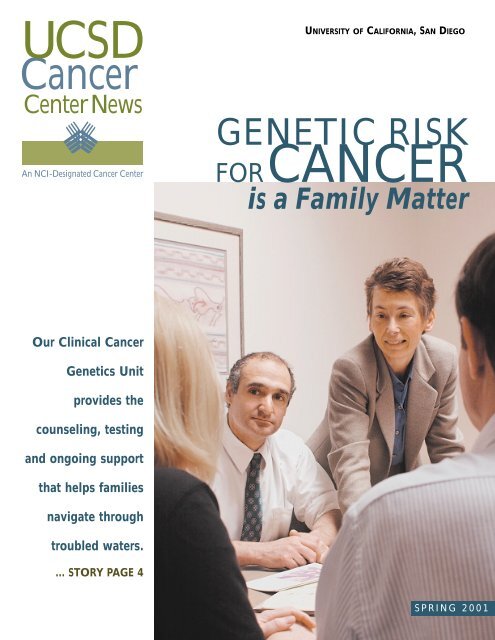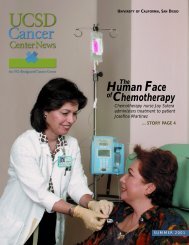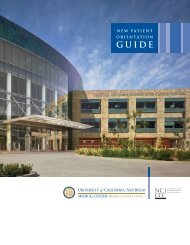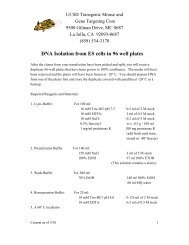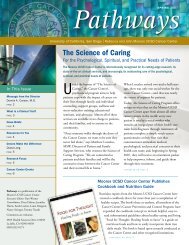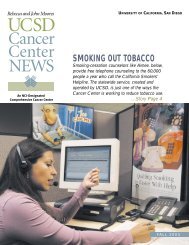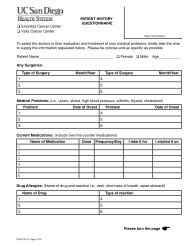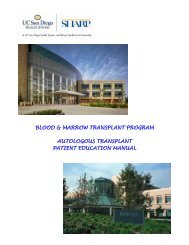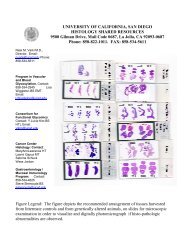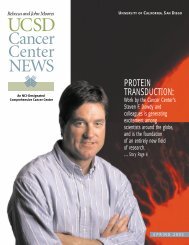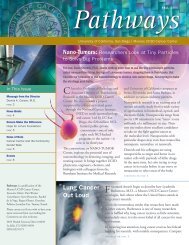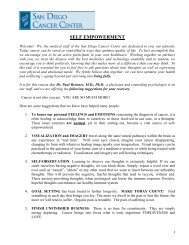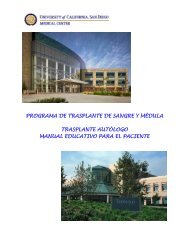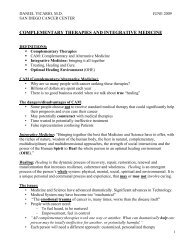FORCANCER - Moores Cancer Center
FORCANCER - Moores Cancer Center
FORCANCER - Moores Cancer Center
Create successful ePaper yourself
Turn your PDF publications into a flip-book with our unique Google optimized e-Paper software.
UCSD<br />
<strong>Cancer</strong><br />
<strong>Center</strong> News<br />
An NCI-Designated <strong>Cancer</strong> <strong>Center</strong><br />
UNIVERSITY OF CALIFORNIA, SAN DIEGO<br />
GENETIC RISK<br />
<strong>FORCANCER</strong><br />
is a Family Matter<br />
Our Clinical <strong>Cancer</strong><br />
Genetics Unit<br />
provides the<br />
counseling, testing<br />
and ongoing support<br />
that helps families<br />
navigate through<br />
troubled waters.<br />
... STORY PAGE 4<br />
SPRING 2001
UCSD <strong>Cancer</strong> <strong>Center</strong> Foundation<br />
PRESIDENT OF THE FOUNDATION BOARD<br />
Frank M. Goldberg*<br />
VICE PRESIDENTS<br />
William T. Comer, Ph.D.*<br />
Howard Goldfeder*<br />
Andre R. Horn*<br />
Jerome S. Katzin, Esq.*<br />
Louis H. Knierim*<br />
Cinda K. Lucas*<br />
BOARD OF DIRECTORS<br />
J. Samuel Armstrong, IV<br />
Terry Ash<br />
Kathryn A. Bernert, Esq.<br />
Howard C. Birndorf<br />
Thomas A. Bologna<br />
Deborah J. Case<br />
Michael J. Changaris, Esq.<br />
Lois Crandell<br />
Jay de Groot<br />
Charles Faith<br />
Lee Goldberg<br />
Charles F. Gorder, Sr., Esq.*<br />
Donald W. Grimm<br />
Bruce R. Hazard<br />
Ernest Huang, Ph.D.<br />
Peter L. Jensen<br />
Jacqueline Johnson, Ph.D.<br />
Peter Johnson<br />
Maurice C. Kaplan, Esq.*<br />
Richard Levi<br />
George Liggins, M.P.H., Ph.D.<br />
Art Lujan<br />
Al Hugo-Martinez<br />
Joany Mosher<br />
Henry L. Nordhoff<br />
Tina Nova, Ph.D.<br />
Carrie M. O’Brien*<br />
Anne S. Otterson<br />
John W. Otterson, II<br />
Cynthia Polak*<br />
Kenneth D. Polin, Esq.<br />
Peter Preuss<br />
David E. Robinson<br />
Lawrence B. Robinson, Esq.<br />
Scott Cameron Smith<br />
Mary Rand Taylor<br />
John Walton<br />
Robert M. Wood, D.V.M., M.P.H.<br />
EX OFFICIO MEMBERS<br />
Osborne L. Bethea, Jr.<br />
Stephen E. Blank<br />
Robert C. Dynes, Ph.D.<br />
Edward W. Holmes, M.D.<br />
Dolores Landa<br />
Diana Lombrozo<br />
George S. Peck, Jr.<br />
ADVISORY BOARD<br />
John R. Bonn, Esq.<br />
Diane Clarke<br />
Audrey Geisel<br />
George L. Gildred<br />
Joseph W. Hibben<br />
Irwin Jacobs, Ph.D.<br />
Marianne McDonald, Ph.D.<br />
John H. Moxley, III, M.D.<br />
C. D. Pruett<br />
Ruth L. Schulman<br />
Walter Zable<br />
DIRECTOR,<br />
UCSD CANCER CENTER<br />
David Tarin, M.D., Ph.D.*<br />
DEPUTY DIRECTOR,<br />
CLINICAL OPERATIONS<br />
David W. Easter, M.D.<br />
DEPUTY DIRECTOR,<br />
RESEARCH OPERATIONS<br />
Thomas J. Kipps, M.D., Ph.D.<br />
DIRECTOR OF DEVELOPMENT<br />
T. Peter Anderson<br />
ASSOCIATE DIRECTOR OF<br />
DEVELOPMENT<br />
Geoffrey C. Graham<br />
ASSISTANT DIRECTOR OF<br />
DEVELOPMENT<br />
Cheryl D. Coate<br />
DEVELOPMENT ASSISTANT<br />
Maryann Lapthorn<br />
* Officers and Members of the<br />
Executive Committee<br />
UCSD <strong>Cancer</strong> <strong>Center</strong> News is a quarterly publication of the<br />
UCSD <strong>Cancer</strong> <strong>Center</strong> Foundation. Comments are welcome.<br />
UCSD <strong>Cancer</strong> <strong>Center</strong> Foundation<br />
9500 Gilman Drive #0658<br />
La Jolla, CA 92093-0658<br />
(858) 822-0022<br />
Executive Editor: T. Peter Anderson • Editor: Nancy Stringer<br />
Contributing Writers: T. Peter Anderson, Geoffrey C. Graham,<br />
Nancy Stringer<br />
Message<br />
from the<br />
Director<br />
Statistics now tell us that<br />
cancer will strike one of<br />
every three people at some<br />
point during their lifetime.<br />
This disease, either through a<br />
sporadic occurrence or because of an inherited susceptibility,<br />
will touch nearly every family.<br />
It is our commitment at UCSD <strong>Cancer</strong> <strong>Center</strong> to provide you<br />
the most advanced and compassionate care should cancer<br />
occur in your family.<br />
In addition, our <strong>Cancer</strong> <strong>Center</strong> is dedicated to preventing<br />
cancer whenever possible, reducing cancer risk through<br />
education and behavior modification, and improving the<br />
outcome of treatment through early detection. To this end,<br />
we have developed a number of innovative and successful<br />
programs.<br />
For example, the California Smokers Helpline — a free,<br />
telephone-based smoking cessation service — was developed<br />
by the <strong>Cancer</strong> <strong>Center</strong> in 1990 and has since grown to become<br />
a statewide service that has assisted more than 100,000 callers<br />
to quit. Based upon our success, other states have established<br />
similar programs. We also have developed cancer education<br />
programs promoting early detection in our local African-<br />
American, Pan-Asian and Hispanic communities, and have<br />
adapted these educational programs for the deaf and hearingimpaired<br />
community. As with the Smokers Helpline, these<br />
efforts have captured the attention of health educators<br />
throughout the nation and, in some cases, have provided the<br />
foundation for similar programs in other states.<br />
An important part of our commitment to cancer prevention<br />
and early detection is genetic counseling and testing. Our<br />
Clinical <strong>Cancer</strong> Genetics Unit is the subject of this issue’s<br />
cover story. I hope you’ll take a moment to read about this<br />
service, which is so important to patients dealing with the<br />
possibility of carrying a gene that could affect loved ones in<br />
their family.<br />
The service, under the direction of Dr. Linda Wasserman, is<br />
an outstanding example of the <strong>Cancer</strong> <strong>Center</strong>’s “interactive”<br />
approach to providing quality care.<br />
UCSD <strong>Cancer</strong> <strong>Center</strong> News<br />
2
In this team, genetics physicians and<br />
counselors partner with cancer prevention<br />
and risk-reduction specialists, and<br />
with genetics researchers who study heritable<br />
risk factors for cancer at the molecular<br />
level and molecular pathologists<br />
who are teasing out the most basic steps<br />
that cause inheritable disease. All of this<br />
knowledge, gleaned from different disciplines<br />
— medicine, psychology, epidemiology,<br />
biology, pathology, and others<br />
— is brought together for the benefit<br />
of patients. The aim is to provide outstanding,<br />
scientifically validated clinical<br />
care coupled with human compassion<br />
and understanding.<br />
Interactivity is a<br />
common thread<br />
running throughout<br />
the many and varied<br />
programs of the<br />
<strong>Cancer</strong> <strong>Center</strong>.<br />
Often, we invite scientists<br />
from other<br />
institutions to visit<br />
for up to a year and<br />
share their expertise with us. In the year<br />
2000, for example, we hosted distinguished<br />
visiting professors from leading<br />
academic institutions in Australia, Chile,<br />
Greece, Italy, Japan, Korea and Spain.<br />
”All of this knowledge,<br />
gleaned from different<br />
disciplines, is brought<br />
together for the benefit<br />
of patients.”<br />
Our newest Distinguished Visiting<br />
Professor is Dr. Eiichi Tahara, Professor<br />
of Pathology, Emeritus, of Hiroshima<br />
University. Dr. Tahara is one of Japan’s<br />
most respected figures in cancer research<br />
and is internationally known for his scientific<br />
contributions to the field, particularly<br />
in the area of gastro-intestinal<br />
cancers. He will collaborate with many<br />
of our senior investigators and will mentor<br />
our younger members.<br />
This kind of interaction provides a rich<br />
experience for the visitor and the member,<br />
bringing new thinking, new insights<br />
and new methods to both sides.<br />
This issue of UCSD <strong>Cancer</strong> <strong>Center</strong> News<br />
is brimming with articles that I believe<br />
you will find interesting and informative.<br />
For example, Dr. Richard Boland has<br />
discovered a strong link between a common<br />
human virus and colorectal cancer,<br />
which he believes may be responsible for<br />
a large percentage of non-hereditary<br />
colon cancer. And Dr. Asad Bashey is<br />
studying a type of blood stem-cell transplant<br />
as a treatment for kidney cancer.<br />
This holds potential as an important<br />
advance as there are few treatment<br />
options available for patients with this<br />
type of cancer. You will also want to read<br />
about ductal lavage, a new procedure<br />
that can detect pre-malignant and<br />
malignant breast cells<br />
long before they<br />
become visible<br />
tumors. This service is<br />
being offered to<br />
women at high risk<br />
for developing breast<br />
cancer through our<br />
Breast Care Unit,<br />
directed by Dr. Anne<br />
Wallace.<br />
In another bit of good news, I’m delighted<br />
to report that we have recruited a<br />
new Associate Director for<br />
Administration. Ira Goodman joins us<br />
May 1 from the Kaplan Comprehensive<br />
<strong>Cancer</strong> <strong>Center</strong> of New York University<br />
where he served as Associate Director for<br />
Administration for 17 years. This is a<br />
position of key importance to UCSD<br />
<strong>Cancer</strong> <strong>Center</strong>, and Ira brings a depth<br />
and breadth of experience that will be an<br />
enormous benefit to our <strong>Center</strong>. We<br />
welcome him with enthusiasm.<br />
I hope you enjoy this issue of UCSD<br />
<strong>Cancer</strong> <strong>Center</strong> News. I look forward to<br />
the opportunity each quarter to bring<br />
you good news about the <strong>Cancer</strong> <strong>Center</strong>.<br />
David Tarin, M.D., Ph.D.<br />
Director, UCSD <strong>Cancer</strong> <strong>Center</strong><br />
IN THIS ISSUE<br />
Clinical <strong>Cancer</strong><br />
Genetics<br />
4<br />
Viral Link<br />
to Colon <strong>Cancer</strong><br />
6<br />
New Hope<br />
for Kidney <strong>Cancer</strong><br />
8<br />
Early Warning<br />
for Breast <strong>Cancer</strong><br />
9<br />
‘Haute Event’<br />
10<br />
Philanthropy Notebook<br />
Back Page<br />
3<br />
UCSD <strong>Cancer</strong> <strong>Center</strong> News
GENETIC TESTING<br />
Is it right for you?<br />
<strong>Cancer</strong> Genetics Service Now Available<br />
<strong>Cancer</strong> touches almost<br />
every family. It’s not<br />
unusual to know of a<br />
parent, grandparent, aunt<br />
or uncle who has cancer. But when<br />
several family members are affected, it<br />
may indicate a hereditary susceptibility<br />
to cancer.<br />
While only a small percentage of<br />
cancers are associated with an inherited<br />
genetic mutation, people with<br />
these mutations can have a lifetime<br />
risk of developing cancer that is<br />
significantly higher than that of the<br />
general population.<br />
For example, a woman’s average lifetime<br />
risk of developing breast cancer<br />
is 12 percent. If she carries a mutation<br />
in one of the currently known breast<br />
cancer genes — BRCA1 or BRCA2 —<br />
her lifetime risk may be as high as 85<br />
percent. Mutations in these genes also<br />
confer an increased risk for ovarian<br />
cancer. Average lifetime risk for ovarian<br />
cancer is 1.4 percent in the general<br />
population, but may be as high as 15<br />
to 40 percent in women with changes<br />
in BRCA1 or 2. Alterations in the<br />
breast cancer genes are also associated<br />
with a somewhat increased risk for<br />
colon and pancreatic cancer in men<br />
and women, and an increased risk of<br />
prostate cancer and breast cancer in<br />
men. Not all people with changes in<br />
these genes go on to develop cancer,<br />
however.<br />
Knowledge is Key<br />
“Genetic counseling and testing may<br />
provide important information to<br />
people with a family history of cancer<br />
who are concerned about<br />
their cancer risk,” said Linda<br />
Wasserman, M.D., Ph.D.,<br />
director of the <strong>Cancer</strong><br />
<strong>Center</strong>’s Clinical <strong>Cancer</strong><br />
Genetics Unit. “This kind<br />
of information affects the<br />
whole family and so we<br />
encourage that spouses,<br />
siblings and adult children<br />
be involved, if that<br />
fits with a particular<br />
family. Often, individuals<br />
considering genetic<br />
testing for themselves<br />
will wish to discuss<br />
the issues involved in<br />
testing with their<br />
family. When this is<br />
the case, involving<br />
everyone in the<br />
counseling process<br />
provides an<br />
opportunity for<br />
all to hear the<br />
same information and discuss the<br />
issues together. However, all patients<br />
are given the option of privacy.”<br />
Genetic privacy with regard to insurance<br />
companies and employers are a<br />
concern of many patients. Ways to<br />
safeguard privacy and confidentiality<br />
are carefully discussed with each<br />
patient.<br />
The Clinical <strong>Cancer</strong> Genetics Unit<br />
provides its counseling and assessment<br />
services at no charge. If a<br />
patient decides to proceed with genetic<br />
testing, the cost can vary from $500<br />
to $2700, depending on the particular<br />
genetic test. Many health plans now<br />
provide coverage for such testing.<br />
“Counseling is a critical component of<br />
genetic testing for cancer susceptibility,”<br />
said Eric Rosenthal, Ph.D., M.S.,<br />
the Clinical <strong>Cancer</strong> Genetics Unit<br />
genetic counselor. “Along with a careful<br />
review of the individual’s personal<br />
and family history of cancer, it is<br />
important to discuss the potential<br />
benefits and risks of genetic testing to<br />
determine if this information is going<br />
to be helpful to the individual.”<br />
For those who are concerned about<br />
their cancer risk, it is important to get<br />
as much information as possible<br />
UCSD <strong>Cancer</strong> <strong>Center</strong> News<br />
4
about their family tree and the exact kinds of cancers that<br />
have affected relatives.<br />
A <strong>Cancer</strong> History<br />
“Our assessments are most useful when we know the history<br />
of cancer in all the blood relatives. That includes parents,<br />
grandparents, siblings, children, grandchildren, aunts,<br />
uncles and cousins,” said Rosenthal. “We need to know<br />
what types of cancers family members had, and the ages at<br />
which they were diagnosed.” The team assesses this family<br />
history to help determine whether the history suggests a<br />
heritable risk, whether the types of cancers in affected family<br />
members is consistent with known syndromes for which<br />
genetic testing might be available, and the degree of cancer<br />
risk of unaffected family members. When genetic testing is<br />
appropriate, the team arranges for the testing. Based upon<br />
the test results, team members will develop an individualized<br />
risk management plan. The plan may include recommendations<br />
for:<br />
■ Monitoring or screening for early detection of cancer<br />
■ Prophylactic surgery<br />
■ Changes in diet and exercise<br />
■ Lifestyle modifications, such as ceasing smoking<br />
■ Clinical trials in cancer prevention<br />
For further information about the services of the Clinical<br />
<strong>Cancer</strong> Genetics Unit at UCSD <strong>Cancer</strong> <strong>Center</strong>, please call<br />
Eric Rosenthal at (858) 657-7066.<br />
Linda Wasserman, M.D., Ph.D.<br />
Dr. Wasserman, Assistant Professor of Clinical<br />
Medicine, is director of the <strong>Cancer</strong> <strong>Center</strong>’s Clinical<br />
<strong>Cancer</strong> Genetics Unit, and of the Molecular Genetics<br />
Laboratory in the Division of Medical Genetics. She<br />
also heads the DNA Sequencing and the Molecular<br />
Pathology Shared Resources; these are large laboratories<br />
that provide sophisticated technical services to<br />
researchers throughout the <strong>Cancer</strong> <strong>Center</strong>. Her own<br />
research focuses on the relationship between genetic<br />
differences in estrogen metabolism and breast cancer,<br />
and on the detection and quantification of circulating<br />
breast cancer cells in peripheral blood. She received her<br />
Ph.D. in psychology from UCLA and was a practicing psychologist for 15 years<br />
before attending medical school at UCSD. She did her residency in anatomic<br />
pathology at UCSD and a postdoctoral fellowship in molecular oncology, funded<br />
by the American <strong>Cancer</strong> Society, at the Ludwig Institute for <strong>Cancer</strong> Research.<br />
.Eric Rosenthal, Ph.D., M.S.<br />
Rosenthal recently joined the UCSD <strong>Cancer</strong> <strong>Center</strong> as<br />
a board certified genetic counselor in the Clinical<br />
<strong>Cancer</strong> Genetics Unit. Before coming to UCSD he provided<br />
genetic counseling for participants in a clinical<br />
genetics research program at the University of Utah.<br />
He is a graduate of a genetic counseling training<br />
program jointly directed by Johns Hopkins University<br />
and the National Human Genome Research Institute<br />
of the NIH. He received his Ph.D. in Cell and<br />
Developmental Biology from Harvard University and<br />
worked as a research biologist for nine years before<br />
becoming a genetic counselor. His current research<br />
interests involve issues of how individuals and families cope with genetic<br />
disorders and how health care providers can more effectively meet their needs.<br />
ARE YOU<br />
AT RISK?<br />
Family histories with one or<br />
more of the following features<br />
may suggest a hereditary cancer<br />
risk:<br />
■ <strong>Cancer</strong>s diagnosed at unusually<br />
young ages, such as breast<br />
cancer under age 40, or colorectal<br />
cancer under age 55<br />
■ Three or more affected individuals<br />
across two generations<br />
■ Individuals diagnosed with<br />
more than one primary cancer<br />
— additional cancers that are<br />
not a recurrence or metastasis<br />
of an earlier tumor<br />
■ Unusual cancers, such as<br />
breast cancer in a male<br />
5<br />
UCSD <strong>Cancer</strong> <strong>Center</strong> News
On the Trail<br />
of Colorectal <strong>Cancer</strong>…<br />
Is it possible that a common human virus could be<br />
responsible for causing colorectal cancer, the third leading<br />
cause of cancer deaths among both men and women?<br />
UCSD <strong>Cancer</strong> <strong>Center</strong><br />
researchers asked this<br />
question in 1994, launching<br />
a small but intense line of investigation<br />
that now may be paying off.<br />
The team, led by C. Richard Boland,<br />
M.D., Associate Director for Clinical<br />
Research, has made recent discoveries<br />
that point to the JC virus (JCV)<br />
as a possible culprit in a large percentage<br />
of cases.<br />
Antibodies to JCV can be found in<br />
80 to 90 percent of the population.<br />
In healthy people it is considered a<br />
harmless passenger.<br />
Boland’s team has found that JCV<br />
normally lives in the colon, but that<br />
it is found in far greater amounts in<br />
cancerous colon tissue than in normal<br />
colon tissue.<br />
“We know this JC virus character lives<br />
in the neighborhood, and that he and<br />
his friends are always found at the<br />
scene of the crime, but we haven’t yet<br />
proven that he’s the perpetrator.”<br />
“What we have at this point is a very suspicious smoking<br />
gun,” says Boland, a widely known and respected<br />
Richard Boland and lab manager, Jennifer Rhees review research data.<br />
authority in colorectal cancer. “We know this JC virus<br />
character lives in the neighborhood, and that he and his<br />
friends are always found at the scene of the crime, but<br />
we haven’t yet proven that he’s the perpetrator.”<br />
Closing In<br />
The team is closing in, however. In the laboratory,<br />
they have inserted the virus into normal colon cells<br />
and watched as it perverted the orderly workings of<br />
the cells.<br />
“This tells us that JC virus, while widely considered<br />
to be harmless, has the capacity in certain circumstances<br />
to disrupt the internal mechanisms of normal<br />
UCSD <strong>Cancer</strong> <strong>Center</strong> News<br />
6
colonic cells,” Boland said.<br />
Now, moving in even closer, they have discovered<br />
that JCV in cancer tissue has a<br />
rearranged DNA sequence not seen in JCV<br />
in normal tissue. The rearrangement<br />
involves the area called the promoter region,<br />
which is the “on-off” switch for the virus.<br />
This most recent finding may explain why<br />
the virus is able to live in the intestinal<br />
tract and not cause any harm most of the<br />
time, but cause serious harm under some<br />
circumstances.<br />
Super Sleuths<br />
“By doing some sophisticated manipulation,<br />
we were able to track the transforming gene<br />
taken from JC virus after inserting it into<br />
colon cells,” Boland said. “When this gene<br />
was introduced, these cells developed the<br />
kind of chromosomal damage that is seen in<br />
the majority of colorectal cancers.”<br />
The transforming gene from the virus<br />
makes a protein that can also cripple the<br />
cell’s normal ability to limit chromosomal<br />
instability, setting the stage for the aberrant<br />
cell to reproduce itself without the usual<br />
constraints. This is a hallmark of cancer.<br />
“So as this research continues, we are gradually<br />
building more evidence that this virus<br />
generates chromosomal instability that, over<br />
time, gives rise to colorectal cancer,” he said.<br />
Boland added that if their work proves the<br />
JC virus is important in the formation of<br />
colorectal cancer, it might be feasible to<br />
develop a vaccine against the virus, similar<br />
to vaccines for hepatitis B and polio.<br />
Boland’s work is being funded through a<br />
grant from the National <strong>Cancer</strong> Institute<br />
and UCSD <strong>Cancer</strong> <strong>Center</strong>.<br />
WHAT YOU SHOULD KNOW<br />
About<br />
Colorectal <strong>Cancer</strong><br />
E<br />
very year approximately 130,000 new cases of colorectal<br />
cancer are diagnosed in the United States, and more<br />
than 56,000 people die from the disease. While colorectal<br />
cancer is one of the most common types of cancer, it is also<br />
one of the most preventable and, if detected early, one of<br />
the most curable.<br />
“Screening is very important in curing this disease,” says<br />
Barbara Parker, M.D., director of UCSD <strong>Cancer</strong> <strong>Center</strong>’s<br />
specialized Gastrointestinal <strong>Cancer</strong>s Unit. “Thousands of lives<br />
could be saved each year if more people took advantage of<br />
available screening procedures.”<br />
Screening for people at average risk and without symptoms<br />
should begin at age 50 and include an annual fecal occult<br />
blood test, a simple procedure that checks a stool sample for<br />
hidden blood; an annual rectal examination by a health care<br />
provider; and every 5 to 10 years either a flexible sigmoidoscopy<br />
or a colonoscopy, both of which enable the physician<br />
to view the interior of the colon to look for and remove any<br />
precancerous growths that can eventually develop into cancer.<br />
Parker also encourages making lifestyle changes that may<br />
reduce risk of developing colon cancer. These changes include<br />
consuming a diet low in fat, and high in fiber, calcium, fruits<br />
and vegetables; participating in regular physical activity; and<br />
avoidance of cigarette smoking.<br />
Although two large studies have not shown a decreased risk<br />
in patients consuming a low-fat, high-fiber diet, many<br />
questions remain unanswered, particularly relating to the role<br />
of vegetables. Additionally, a low-fat, high-fiber diet may be<br />
beneficial for the prevention of other chronic diseases. The<br />
National <strong>Cancer</strong> Institute is currently studying certain drugs<br />
(inhibitors of cyclo-oxygenase) and the nutrients folic acid<br />
and calcium for the possibility that these agents may reduce<br />
polyps and colon cancer.<br />
If colorectal cancer is detected at its earliest stage, the fiveyear<br />
survival rate is about 90 percent. Found after it has<br />
spread to lymph nodes, the five-year rate drops to about 50<br />
percent. If the disease has metastasized to distant sites, the<br />
5-year survival rate falls to 5 percent.<br />
7<br />
UCSD <strong>Cancer</strong> <strong>Center</strong> News
New Information Service<br />
ON OUR WEB SITE<br />
UCSD <strong>Cancer</strong> <strong>Center</strong> is making<br />
access to cancer information<br />
easier than ever with a new<br />
service on our Web site.<br />
The <strong>Cancer</strong> Information Service (CIS) of<br />
the National <strong>Cancer</strong> Institute provides<br />
answers to commonly asked questions in<br />
a monthly column called “Ask the CIS.”<br />
Just visit the <strong>Cancer</strong> <strong>Center</strong>’s homepage<br />
at http://cancer.ucsd.edu and click on<br />
the “Ask the CIS” logo for new topics<br />
each month. Here is a sampling of topics<br />
you’ll find:<br />
■ Non-drug Treatments for <strong>Cancer</strong> Pain<br />
■ Inflammatory Breast <strong>Cancer</strong><br />
■ Clinical Trials<br />
■ Post-Traumatic Stress Disorder<br />
■ Cell Phones and <strong>Cancer</strong><br />
■ Environmental Tobacco Smoke<br />
■ Metastatic <strong>Cancer</strong><br />
In addition, to talk with a CIS cancer<br />
information specialist, individuals can call<br />
the <strong>Cancer</strong> Information Service toll-free at<br />
1-800-4-CANCER between 9 a.m. and<br />
4:30 p.m. These information specialists<br />
provide callers with individualized<br />
answers to questions about cancer prevention,<br />
diagnosis, treatment, symptoms<br />
and risks, and clinical trials. CIS staff<br />
answer calls in English and Spanish, and<br />
from deaf and hard-of-hearing callers.<br />
New Hope<br />
for Kidney <strong>Cancer</strong><br />
Physicians with<br />
the UCSD<br />
Blood and<br />
Marrow Transplant<br />
Program are evaluating<br />
an experimental<br />
type of stem cell<br />
transplant for its<br />
effectiveness against<br />
advanced kidney<br />
cancer, a disease<br />
known to be highly<br />
resistant to conventional<br />
therapy and usually fatal.<br />
This approach, which uses<br />
blood stem cells donated by the<br />
patient’s matched sibling or<br />
matched unrelated donor, has<br />
shown promise in a small<br />
research study recently conducted<br />
at the National Institutes of<br />
Health. In that study of 19<br />
patients, 53 percent had either<br />
complete or partial regression<br />
of their disease. Some patients<br />
have remained completely free<br />
of disease more than two years<br />
after treatment.<br />
Researchers attribute these<br />
results to an immune response<br />
that the donor cells develop<br />
against the recipient’s cancer, a<br />
phenomenon known as a “graft<br />
versus tumor response.” This is<br />
often seen in certain leukemias<br />
and lymphomas, but kidney<br />
Dr. Asad Bashey, M.D., Ph.D.<br />
cancer is the first<br />
solid tumor to<br />
exhibit the<br />
response.<br />
“The NIH study was<br />
small, but the results<br />
were so dramatic we<br />
believe they represent<br />
a tremendous<br />
advance against this<br />
disease,” said Asad<br />
Bashey, M.D., Ph.D.,<br />
a member of UCSD <strong>Cancer</strong><br />
<strong>Center</strong> and assistant professor<br />
of medicine at UCSD School of<br />
Medicine. “These early results<br />
are particularly exciting when<br />
you consider that we’ve had<br />
precious little to offer patients<br />
who were not helped by conventional<br />
therapy.”<br />
The UCSD clinical trial is open<br />
to patients with a sibling who<br />
can donate stem cells for the<br />
transplant. For patients lacking a<br />
suitable sibling donor, an alternative<br />
trial is designed to use<br />
matched unrelated donors<br />
obtained through the large<br />
volunteer donor database from<br />
the National Marrow Donor<br />
Program. For further information<br />
about this study call the<br />
UCSD Blood and Marrow<br />
Transplant Program,<br />
(858) 657-6840.<br />
Correction: In the Winter 2001 issue of UCSD <strong>Cancer</strong> <strong>Center</strong><br />
News we mistakenly identified Thomas J. Kipps, M.D., Ph.D., as<br />
leader of the <strong>Center</strong>’s Translational Oncology Program. That post is<br />
now held by Edward D. Ball, M.D. We regret the error.<br />
…Editorial Staff<br />
UCSD <strong>Cancer</strong> <strong>Center</strong> News<br />
8
Magnifying the Search<br />
for Breast <strong>Cancer</strong><br />
Researchers have known for decades that most breast<br />
cancer starts in the cells lining the milk ducts. Until<br />
recently, though, there was no way to see how these<br />
cells were behaving until they formed a lump that could be<br />
felt or seen on a mammogram.<br />
A new method called ductal lavage allows doctors to collect<br />
milk duct cells and look for possible early warning signs of<br />
breast cancer. UCSD <strong>Cancer</strong> <strong>Center</strong> is among the first in<br />
the nation to offer ductal lavage to women at high-risk for<br />
breast cancer.<br />
In a recent clinical study, ductal lavage detected abnormal<br />
cells in 24 percent of the high-risk women who enrolled in<br />
the study. All of the women had non-suspicious mammograms<br />
and physical exams within the 12 months prior to<br />
their participation.<br />
“Ductal lavage gives us the ability to look for the very<br />
beginnings of abnormal changes,” said Anne Wallace, M.D.,<br />
director of UCSD <strong>Cancer</strong> <strong>Center</strong>’s Breast Care Unit.<br />
“It can offer high-risk women unique, early information<br />
when used in conjunction with mammography and breast<br />
examination.”<br />
During ductal lavage, a tiny microcatheter is inserted into<br />
the duct through its natural opening on the nipple. (The<br />
use of topical anesthetic prevents discomfort for most<br />
women.) A teaspoon of saline is flushed through the<br />
microcatheter to “rinse” the duct to collect cells. The fluid<br />
is sent to a laboratory for analysis.<br />
For more information about ductal lavage, call the <strong>Cancer</strong><br />
<strong>Center</strong>’s toll-free information line: 1-866-558-7933.<br />
A Treatment Against Metastasis?<br />
UCSD <strong>Cancer</strong> <strong>Center</strong><br />
researchers have obtained<br />
evidence that the common<br />
anticoagulant drug heparin diminishes<br />
metastasis of certain cancers in<br />
mice by interfering with interactions<br />
between platelets (a type of normal<br />
blood cell) and specific molecules on<br />
tumor cell surfaces.<br />
The researchers, reporting in the<br />
March 13 issue of the Proceedings of<br />
the National Academy of Sciences, say<br />
these findings make a compelling<br />
argument for initiating clinical trials<br />
of heparin in patients with newly<br />
diagnosed cancer.<br />
“The notion of using anticoagulants<br />
to inhibit metastasis is not new,” said<br />
the study’s senior author Ajit Varki,<br />
M.D. “However, our new findings suggest<br />
that heparin therapy to prevent<br />
the spread of cancer in humans<br />
should be revisited.”<br />
Animal studies in the ‘60s and ‘70s<br />
showed that heparin — which is<br />
delivered by injection or intravenously<br />
— inhibits metastasis. Follow-up<br />
human studies focused instead on the<br />
use of oral anticoagulants, which are<br />
easier to manage than heparin. Those<br />
attempts failed, however, and research<br />
in this area stalled.<br />
The new research, led by Lubor<br />
Borsig, Ph.D., a postdoctoral fellow<br />
working in Varki’s laboratory, details<br />
heparin’s precise mechanism and<br />
explains why earlier clinical trials<br />
using oral anticoagulants failed.<br />
“Our findings show that the antimetastatic<br />
effect of heparin is not due<br />
to its ability to prevent blood clotting,<br />
as was previously thought, but rather<br />
its blockage of early tumor-platelet<br />
interactions in the bloodstream,” said<br />
Borsig. “Oral anticoagulants work by a<br />
completely different mechanism and<br />
do not block these interactions.”<br />
When cancer cells break away from the<br />
original tumor and enter the bloodstream<br />
they attract platelets, which<br />
bind to sugarcoated molecules on the<br />
cancer cell surface, forming a cloak.<br />
This platelet cloak appears to protect<br />
the tumor cells from the body’s natural<br />
defense system, enabling them to<br />
establish new tumors in other parts of<br />
the body. Heparin interferes with formation<br />
of the platelet cloak, apparently<br />
leaving tumor cells exposed to<br />
attack by white blood cells.<br />
This work involved an active collaboration<br />
with UCSD <strong>Cancer</strong> <strong>Center</strong> laboratories<br />
for Histology (directed by<br />
Nissi Varki, Ph.D.) and Digital<br />
Imaging (directed by James<br />
Feramisco, Ph.D.), and with the San<br />
Diego Supercomputer <strong>Center</strong> (David<br />
Nadeau). It was supported by a grant<br />
from the National <strong>Cancer</strong> Institute.<br />
9<br />
UCSD <strong>Cancer</strong> <strong>Center</strong> News
Sizzles for<br />
UCSD <strong>Cancer</strong> <strong>Center</strong><br />
Richard Levi and his daughter<br />
Lonnie Levi Israel<br />
Lee and Frank Goldberg<br />
Dolores Landa and<br />
Diana Lombrozo<br />
Chef Jeffrey Strauss and<br />
assistant, Pamplemousse<br />
Grille, Solana Beach<br />
Black tie and ball gowns were the order<br />
of the evening March 3 as 650 friends of<br />
cancer research gathered at the Sheraton<br />
San Diego Harbor Island Hotel and Marina to<br />
savor the gourmet magic of the 20th Annual<br />
Celebrities Cook for the UCSD <strong>Cancer</strong> <strong>Center</strong>.<br />
In keeping with this year’s theme of “Hot Haute<br />
Cuisine,” 10 noted chefs representing restaurants<br />
from Honolulu to Washington, D.C., offered up<br />
some of their most creative appetizers during a<br />
two-hour reception that preceded a formal sitdown<br />
dinner and dancing in the Sheraton’s<br />
Grande Ballroom.<br />
Event Co-chairs Dolores Landa and Diana<br />
Lombrozo led the volunteer efforts of the UCSD<br />
<strong>Cancer</strong> <strong>Center</strong> Associates in staging another<br />
successful gala, which will net approximately<br />
$300,000 for the <strong>Cancer</strong> <strong>Center</strong>’s research and<br />
community outreach programs. The dedication of<br />
the evening to the memory of Harriet Levi, a<br />
longtime Associates volunteer and benefactor of<br />
the <strong>Cancer</strong> <strong>Center</strong>, inspired an outpouring of<br />
generosity in support of the event.<br />
Honorary chairs were Rebecca and John <strong>Moores</strong>.<br />
Honorary co-chairs were Lee and Frank Goldberg,<br />
along with Audra and Howard Birndorf.<br />
Miriam and Jerry Katzin<br />
Executive Chef David Abella,<br />
Roy’s, La Jolla<br />
Left to Right: Tom Franklin, Michael Bartell, Rusti Bartell-Weiss (front),<br />
Melissa Bartell, Ina Bartell (front), Richard and Liz Bartell,<br />
Suzy and Steve Weiss<br />
Virginia Monday, Audrey Geisel, Alex Butterfield<br />
and Ruth Grobstein<br />
UCSD <strong>Cancer</strong> <strong>Center</strong> News<br />
10
Gorder Walk Offers<br />
Family Fun to Fight Melanoma<br />
V<br />
olunteers in the fight against<br />
melanoma will take new strides<br />
toward a cure when the 8th Annual<br />
Bruce Brunner Gorder Memorial<br />
Melanoma Walk-a-thon returns to<br />
UCSD’s La Jolla campus in June. The<br />
event provides a festive morning of<br />
fun to raise funds for research into this<br />
increasingly common form of cancer.<br />
<strong>Cancer</strong> <strong>Center</strong> Foundation Board<br />
member Chuck Gorder will once again<br />
chair the walk, slated for Saturday,<br />
June 23, in memory of his son Bruce.<br />
The Gorder Walk-a-thon is a familyfriendly<br />
event that attracts participants<br />
of all ages and fitness levels.<br />
There will be<br />
prizes for the team<br />
with the largest number<br />
of participants and for the<br />
team that raises the largest amount in<br />
contributions.<br />
As in previous years, proceeds will<br />
benefit melanoma cancer research at<br />
UCSD <strong>Cancer</strong> <strong>Center</strong>. The significance<br />
of this philanthropy was highlighted<br />
during the past year with the<br />
announcement that the memorial<br />
fund had helped to support development<br />
of a new drug-combination<br />
therapy that has proven superior to<br />
existing treatments in extending<br />
patient lives.<br />
Contributions<br />
to the Gorder<br />
Walk-a-thon<br />
are welcome in<br />
all amounts, with<br />
sponsors at a level of $500 or above<br />
receiving recognition in the event program.<br />
The Walk has raised over<br />
$500,000 since its inception. This year,<br />
Gorder has set a goal to raise $100,000,<br />
the first $25,000 of which he has<br />
pledged to match.<br />
To register or to find out about other<br />
ways to help, please contact Cheryl<br />
Coate in the <strong>Cancer</strong> <strong>Center</strong><br />
Foundation office, 858-822-1390 or<br />
e-mail ccoate@ucsd.edu.<br />
Foundation Appoints<br />
Two New Board Members<br />
T<br />
he UCSD <strong>Cancer</strong> <strong>Center</strong><br />
Foundation is pleased to<br />
announce the recent addition to its<br />
Board of Directors of two leaders in<br />
the San Diego community, Deborah<br />
J. Case of Jamul, and Robert M.<br />
Wood, D.V.M., of Escondido.<br />
Case has extensive experience in<br />
retail merchandising management<br />
with Saks Fifth Avenue. She is<br />
presently the San Diego Area<br />
Manager for Saks and the General<br />
Manager for the Fashion Valley store,<br />
after having held prior positions<br />
with Saks in Beverly Hills, Woodland<br />
Hills and San Francisco, and in Boca<br />
Raton, Florida. For the past two<br />
years, she has played an instrumental<br />
role in the success of Saks Fifth<br />
Avenue’s local “Fashion Targets<br />
Breast <strong>Cancer</strong>” promotion to raise<br />
funds for breast cancer research at<br />
UCSD <strong>Cancer</strong> <strong>Center</strong>.<br />
Wood brings to his role over 30 years<br />
of experience in business consulting,<br />
program development and project<br />
management for public agencies and<br />
private corporations. He earned a<br />
Doctor of Veterinary Medicine<br />
degree from the University of<br />
Minnesota. His varied professional<br />
background includes leadership in<br />
higher education administration and<br />
significant expertise in scientific<br />
research, market development, and<br />
new product management. Wood’s<br />
family has a history of philanthropy<br />
to cancer research at other nationally<br />
prominent institutions besides the<br />
UCSD <strong>Cancer</strong> <strong>Center</strong>.<br />
<strong>Cancer</strong> <strong>Center</strong> Director David Tarin<br />
expressed his enthusiasm for the<br />
new Board appointments: “Debbie<br />
and Bob bring a level of enthusiasm<br />
to their involvement with the<br />
<strong>Cancer</strong> <strong>Center</strong> that inspires all of us<br />
who are joined in the crusade at<br />
UCSD to defeat cancer. We are most<br />
fortunate to be the beneficiaries of<br />
their volunteer service.”<br />
Special Events<br />
CALENDAR<br />
JUNE 23, 2001:<br />
8th Annual Bruce Brunner Gorder<br />
Memorial Melanoma Walk-a-thon<br />
UCSD Campus (behind the School of<br />
Medicine) 8:30 - 10:30 a.m.<br />
No entry fee; donations encouraged!<br />
Call (858) 822-1390<br />
AUGUST 26, 2001:<br />
8th Annual Luau & Longboard<br />
Invitational<br />
Scripps Institution of Oceanography, La Jolla<br />
7:00 a.m. - 5:00 p.m.<br />
Contact Steve Blank, (858) 822-2293<br />
OCTOBER 18-20, 2001<br />
14th Annual Pete Lopiccola<br />
Memorial Marlin Tournament<br />
Cabo San Lucas, Baja California, Mexico<br />
Call (858) 822-1390 or the For Pete's Sake<br />
hotline at (619) 475-4636<br />
OCTOBER 18-23, 2001<br />
3rd Annual Saks Fifth Avenue<br />
“Fashion Targets Breast <strong>Cancer</strong>”<br />
Saks Fifth Avenue stores in Fashion Valley<br />
Mall and downtown La Jolla<br />
Contact (858) 822-1390<br />
11<br />
UCSD <strong>Cancer</strong> <strong>Center</strong> News
PHILANTHROPY NOTEBOOK<br />
As part of our ongoing commitment to help you<br />
make the most of your philanthropic support of<br />
the <strong>Cancer</strong> <strong>Center</strong> and other non-profit organizations,<br />
we are pleased to provide you with the<br />
following information on a unique way to use<br />
charitable remainder trusts.<br />
Charitable Trusts to<br />
Fund Educational Expenses<br />
Every spring marks a special turning point in the lives of<br />
thousands of teenagers: high school graduation. And each<br />
year many young people go on to begin their college studies.<br />
College can be a very special rite of passage, but as most<br />
parents and grandparents know, it<br />
can also be an expensive one.<br />
A growing number of charitably<br />
inclined individuals have discovered<br />
the value of a charitable remainder<br />
trust to fund the educational<br />
expenses of their children or<br />
grandchildren, and to maintain<br />
their philanthropic goals.<br />
Take for example Mr. and Mrs.<br />
Appleton, who promised to help<br />
pay for their granddaughter’s college<br />
expenses many years ago. To do<br />
this, the Appletons considered a<br />
variety of options, including selling<br />
their highly appreciated securities;<br />
however, this option would have<br />
Donors<br />
Mr. & Mrs. Appleton<br />
Charitable<br />
Remainder<br />
Trust<br />
Cash, marketable securities<br />
or other appreciated assets<br />
Income to child<br />
or grandchild<br />
for educational<br />
expenses<br />
Charitable<br />
Remainder Gift<br />
after 4 years<br />
generated a significant capital gains tax on the profit from<br />
the sale.<br />
Ultimately, the Appletons chose to fund a charitable<br />
remainder trust with their appreciated assets. A charitable<br />
remainder trust can be established for a specific period of<br />
time up to 20 years.<br />
In the Appletons’ case, they created a charitable remainder<br />
trust to provide four annual payments to their granddaughter<br />
during her college career. After the four-year<br />
period, the remaining assets in the trust were distributed to<br />
the Appletons’ favorite charity.<br />
Additionally, the Appletons benefited<br />
because they received a charitable<br />
income tax deduction during the<br />
year the trust was established, and<br />
the securities were sold free of capital<br />
gains tax by the charitable remainder<br />
trust.<br />
For further information about charitable<br />
remainder trusts and how they<br />
can fulfill your financial goals, contact<br />
Geoff Graham, Associate<br />
Director of Development, at (858)<br />
822-0024 or gcgraham@ucsd.edu.<br />
This article is not intended to offer<br />
legal or tax advice. Specific circumstances<br />
may vary and services of an<br />
attorney and/or professional advisor<br />
should be obtained.<br />
UCSD <strong>Cancer</strong> <strong>Center</strong><br />
9500 Gilman Drive #0658<br />
La Jolla, CA 92093-0658<br />
(858) 822-0022<br />
Non-Profit Org.<br />
U.S. Postage<br />
PAID<br />
San Diego, CA<br />
Permit #1909


